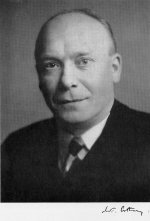William T. Astbury
Oswald T. Avery
Sir William Lawrence Bragg
Erwin Chargaff
Martha Chase
Robert B. Corey
Francis H. C. Crick
Max Delbrück
Jerry Donohue
Rosalind Franklin
R. D. B. (Bruce) Fraser
Alfred D. Hershey
Linus Pauling
Peter J. Pauling
Max F. Perutz
J. T. (John Turton) Randall
Verner Schomaker
Alexander R. Todd
James D. Watson
Maurice H. F. WilkinsView all Key Participants
|

Portrait of William T. Astbury. 1950s.
More Info
William T. Astbury1898-1961
Papers and Correspondence of William Thomas Astbury, 1898-1961
Location: Special Collections, Leeds University Library
Address: Woodhouse Lane, Leeds, West Yorkshire, LS2 9JT, England
Size: 39 boxes, 378 items
Finding Aid: http://lib.leeds.ac.uk/record=b2646338~S1
Phone: 0113-343-5518 or 0113-343-6383 Fax: 44-0113-343-5561
Email: specialcollections@library.leeds.ac.uk Web: http://www.leeds.ac.uk/library/spcoll/
Correspondence with A. V. Hill, 1948-1951
Location: Churchill Archives Center, Churchill College
Address: Cambridge, CB3 0DS, United Kingdom
Size: A component of The Papers of Professor A. V. Hill, series II 4/1-85, folder Correspondence
A, Part 5
Finding Aid: http://www.chu.cam.ac.uk/archives/collections/full.php#HILL
Phone: 44-1223-336087 Fax: 44-1223-336135
Email: archives@chu.cam.ac.uk Web: http://www.chu.cam.ac.uk/archives/
Correspondence
Pictures and Illustrations
Published Papers and Official Documents
Manuscript Notes and Typescripts
Quotes
"A good example...is the case of the alpha helix. Pauling had set up a group to do
X-ray crystallography of the subunits of the proteins, and they got very precise data
that enabled him to build up the whole molecule from the parameters of the subunits.
As you know, he did this successfully in 1948 in London, but did nothing about it
because his final picture of the alpha helix in 1948 did not agree with the X-ray
diagram of the whole molecule....He then waited two years, until 1950, when the group
at I.C.I. in London published the first X-ray pictures of synthetic polypeptides.
These synthetic polypeptides did not have the anonymous reflection that Astbury's
fixtures had had, and could be accommodated to the alpha helix; and he then published
the paper. I think he was hoping to do the same thing with nucleic acids, because
enough had been published on the subunits for him to do it, but he was misled by the
erroneous pictures of the whole molecule."
Robert Olby. Interview with Gerald James Holton. Plenary Sessions of the Conference on Transforming
Conceptions of Modern Science, Bellagio, Italy. September 1969.
I discovered that Rosalind Franklin and Raymond Gosling were working together on the
structure of DNA, but not in collaboration with Wilkins. Moreover, they had the best
DNA preparation. This was a preparation of calf thymus NaDNA that had been given to
Wilkins some two years earlier by Rudolf Signer, of Bern, and from gels of which material
Wilkins was able to draw thin, uniform fibres showing sharp extinction between crossed
polarizers. Gosling and Wilkins had obtained X-ray diffraction photographs from these
fibres indicating a high degree of crystallinity, and were a great improvement on
those obtained earlier by W. T. Astbury and Florence Bell in their pioneering studies
of DNA. They achieved this by passing hydrogen through water and then into the X-ray
camera so that the fibres were kept in a moist atmosphere during the exposure.
Hugh Wilson. H. R. Wilson, "The double helix and all that," Reflections on biochemistry, TIBS 13. July 1988. Video Clips
|

